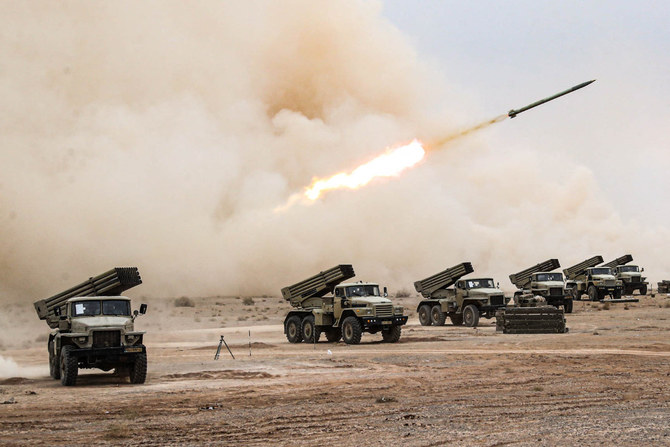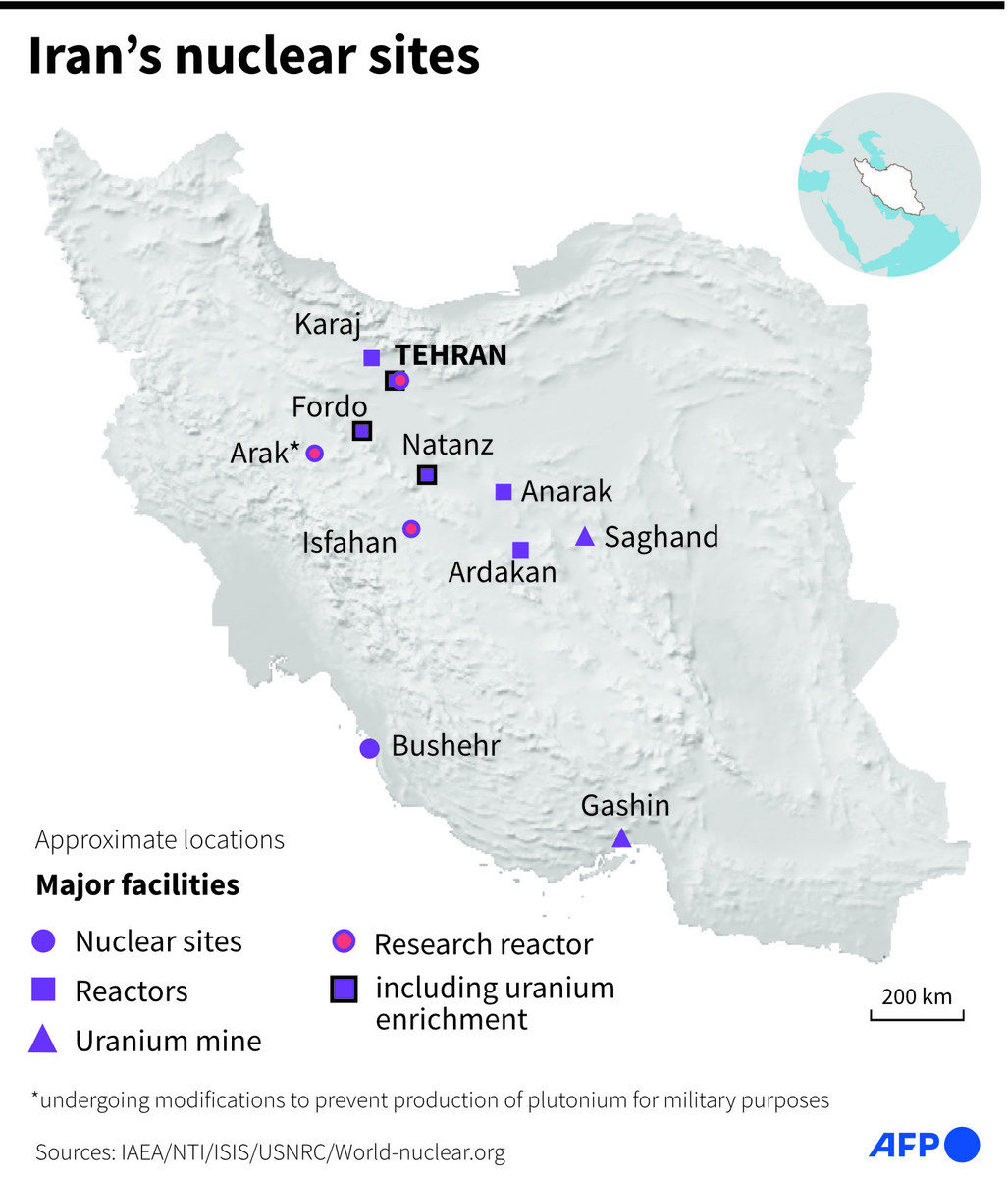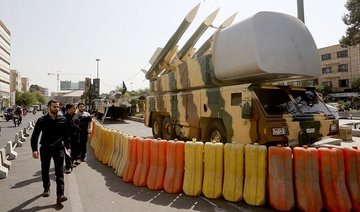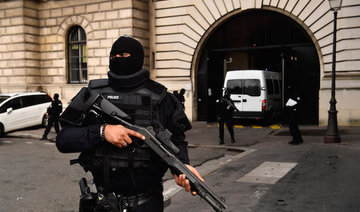TEHRAN: France’s foreign minister traveled to Iran on Monday to reaffirm Europe’s commitment to a nuclear deal that opened the Iranian economy to investment, but also to echo concerns raised by US President Donald Trump who has threatened to quit the agreement.
Jean-Yves Le Drian will tell Iran it must address the West’s misgivings about its ballistic missile program and military activities around the Middle East — points the White House says need attention if the nuclear pact is to survive.
“We’re not going to be Donald Trump’s envoys or Iran’s defense lawyers,” said a French diplomatic source. “We have our own concerns and will talk to the different sensibilities of the Iranian system to get our point across.”
Trump has said European allies must help “fix” the nuclear deal before a May 12 deadline.
Le Drian said on Sunday that Iran needed to address concerns over its ballistic missile program or risk new sanctions. Iran immediately rejected France’s concern over its missile program as “wrong,” the semi-official Fars News agency said.
Hard-line media reacted angrily to Le Drian’s remarks with headlines like “Rude guest” and “Weapons of mass seduction lands in Tehran,” while highlighting Iran’s determination to go ahead with its missile program.
Fars said a group of hard-liners gathered at Tehran’s International Mehrabad Airport to protest Le Drian’s visit.
The 2015 accord between France, Britain, Germany, Russia, China and the United States gave Iran relief from economic sanctions in return for curbs to its nuclear program, allowing Tehran to talk trade with Europe for the first time in years.
The nuclear deal that was pragmatist President Hassan Rouhani’s headline achievement has failed to bring the immediate economic benefits that many expected.
That has slowed down Rouhani’s efforts to engage with the West, opposed by influential allies of Iran’s top authority Supreme Leader Ayatollah Ali Khamenei who remain uneasy about Iran’s efforts to court its old enemies.
France has been quick to restore trade ties. Planemaker Airbus, oil major Total and automobile manufacturers Peugeot and Renault have signed deals, all of which could be at risk if Trump walks out of the accord.
In an effort to keep him on board, French President Emmanuel Macron has criticized Iran’s ballistics program and raised the possibility of new sanctions.
On the eve of Le Drian’s visit, he told Rouhani France expects Iran to make a “constructive contribution” to solving crises in the Middle East, Macron’s office said on Sunday.
Tehran supports Syrian President Bashar Assad against rebels, including groups backed by the West, and backs Israel’s enemy Hezbollah in Lebanon.
The two presidents agreed in their phone call to work together in the coming days with the United Nations, the Syrian government and other countries involved to improve the situation for civilians and make a cease-fire effective, Paris said.
France has urged Washington to see the nuclear deal separately from Iran’s regional activities and its missile program, and Le Drian will stress Macron’s commitment to the nuclear accord, especially as Iran is respecting its terms, French officials said.
Le Drian is due to meet Rouhani and Foreign Minister Mohammad Javad Zarif as well as officials close to Khamenei, including Ali Shamkhani, secretary of the Supreme National Security Council.
Khamenei said on March 1 that Iran would keep supporting Assad’s war effort and a Foreign Ministry spokesman on Sunday rejected Macron’s comments about Iran’s missile program, insisting its “defensive missile work” would continue.
An official close to Rouhani said Iran “has always been open to talks and to resolve issues through diplomacy ... but this does not mean we will yield to unjust pressure over our inevitable rights, whether defensive or anything else.”
While France says Iran is sticking to the terms of the nuclear deal, it may not be respecting part of UN resolution 2231 that calls on it to refrain from work on ballistic missiles designed to carry nuclear warheads.
The resolution enshrines the nuclear deal, which itself makes no explicit reference to the ballistics program, but it is unclear whether the wording binds Tehran to an obligatory commitment on missiles.
“On the ballistics, the Iranian program is not compatible with 2231 and we have a particular concern on the transfer of know-how of ballistic capacity to regional actors and by that we mean Hezbollah,” said the diplomatic source.
Iran has repeatedly said its missile program is purely defensive and not in violation of the UN resolution.
A second French diplomat said: “While our concerns aren’t directly linked to the nuclear deal, it’s important we make progress on these other subjects because otherwise Trump risks killing the deal.”
French minister to lay out concerns on ballistics, regional role in Iran visit
French minister to lay out concerns on ballistics, regional role in Iran visit

Dubai carrier Emirates suspends check-in for onward connections, flydubai cancels Iran flights

- Emirates suspends check-in for all customers in its network travelling with onward connections through Dubai
DUBAI: Dubai’s flydubai airline canceled flights to Iran on Friday after receiving an official alert, a statement said.
“In line with the issued NOTAM (notice to air missions), our flights to Iran today have been canceled,” said the statement
One flight which had already departed for Tehran returned to Dubai after the Iranian capital’s airport was closed, it added.
Flights were suspended across swathes of Iran as Iranian state media reported explosions in the central province of Isfahan.
Flight-tracking software showed commercial flights avoiding western Iran, including Isfahan, and skirting Tehran to the north and east.
Emirates meanwhile said on Friday it was suspending check-in for all customers in its network travelling with onward connections through Dubai until 2359 GMT on April 19.
Emirates, one of the world’s biggest international airlines, added that customers travelling to Dubai as their final destination may check-in and travel as usual.
Emirates and flydubai have experienced serious disruption this week after record rainfall caused more than 1,000 flight cancelations at Dubai airport, one of the world’s busiest air hubs.
Iran closes air space, commercial flights diverted after apparent Israeli retaliatory strikes

- Drones shot down over Isfahan, says Iranian state media
- Israel military refuses to comment on incident
DUBAI/WASHINGTON: Israeli missiles have hit a site in Iran, ABC News reported late on Thursday, citing a US official, while Iranian state media reported an explosion in the center of the country, days after Iran launched a retaliatory drone strike on Israel.
Commercial flights began diverting their routes early Friday morning over western Iran without explanation as one semiofficial news agency in the Islamic Republic claimed there had been “explosions” heard over the city of Isfahan.
Some Emirates and Flydubai flights that were flying over Iran early on Friday made sudden sharp turns away from the airspace, according to flight paths shown on tracking website Flightradar24.
“Flights over Isfahan, Shiraz and Tehran cities have been suspended,” state media reported.
Iranian officials said its air defenses did shot down several drones but there had been “no missile attack for now” on the country.
The state-run IRNA news agency reported that Iran fired air defense batteries early Friday morning across several provinces after reports of explosions near the city of Isfahan.
Several drones “have been successfully shot down by the country’s air defense, there are no reports of a missile attack for now,” Iran’s space agency spokesman Hossein Dalirian says on X.
The Fars news agency said “three explosions” were heard near the Shekari army airbase near Isfahan.
Iran’s local media also reported that nuclear facilities in Isfahan were “completely secure” after explosions were heard near the area.
“Nuclear facilities in Isfahan province are completely secure,” Tasnim news agency reports, quoting “reliable sources.”
Israel had said it would retaliate against Iran’s weekend attack, which involved hundreds of drones and missiles in retaliation for a suspected Israeli strike on its embassy compound in Syria. Most of the Iranian drones and missiles were downed before reaching Israeli territory.
Several Iranian nuclear sites are located in Isfahan province, including Natanz, centerpiece of Iran’s uranium enrichment program. Isfahan, Isome 350 kilometers (215 miles) south of Iran’s capital, Tehran, is also home to a major air base for the Iranian military.
Meanwhile in Iraq where a number of Iranian-backed militias are based, residents in Baghdad reported hearing sounds of explosions, but the source of the noise was not immediately clear.
In Syria, a local activist group said strikes hit an army position in the south of the country Friday.
“There were strikes on a Syrian army radar position,” said Rayan Maarouf, who runs the Suwayda24 anti-government website that covers news from Sweida province in the south.
Iranian military positions in Syria had been frequently targetted by Israeli air strikes over the past years. Early this month, an Israeli strike demolished a consular building annex of the Iranian Embassy in Sydia's capital Damascus, killing 13 people, including two generals of Iran's Revolutionary Guards, triggering the Iranian missiles and drones attack on Israel on April 13.
At the United Nations Security Council on Thursday, Iran urged member nations that Israel “must be compelled to stop any further military adventurism against our interests” as the UN secretary-general warned that the Middle East was in a “moment of maximum peril.”
Israel had said it was going to retaliate against Iran’s April 13 missile and drone attack.
Analysts and observers have been raising concerns about the risks of the Israel-Gaza war spreading into the rest of the region.
Oil prices and jumped on the reports of the Israeli strike. Brent crude futures rose 2 percent to $88.86 a barrel, the dollar gained broadly, gold rose 1 percent and S&P 500 futures dropped 1 percent.
Israel’s assault on Gaza began after Palestinian Islamist group Hamas attacked Israel on Oct. 7, killing 1,200, according to Israeli tallies.
Israel’s military offensive has killed over 33,000 Palestinians in Gaza, according to the local health ministry.
Iran-backed groups have declared support for Palestinians, launching attacks from Lebanon, Yemen and Iraq.
United States had advance warning of Israel attack on Iran: US media

- US media: Israel had provided Washington with pre-notification of the strike
- Tehran’s two major airports resumed flights following a brief suspension
DUBAI/WASHINGTON/TEHRAN: The United States received advance notice of Israel’s reported strike on Iran but did not endorse the operation or play any part in its execution, US media quoted officials as saying.
NBC and CNN, citing sources familiar with the matter and a US official, respectively, said Israel had provided Washington with pre-notification of the strike.
Various networks cited officials confirming a strike had taken place inside Iran, with CNN quoting one official as stating the target was not a nuclear facility.
Israel told the United States on Thursday it would be retaliating against Iran in the coming days, a senior US official told CNN.
“We didn’t endorse the response,” the official said, according to CNN.
There was no immediate comment from the White House about the Israeli strike.
In response to a query from AFP, the Pentagon duty desk said: “We do not have anything to offer at this time.”
Iran activated its air defense system over several cities, state media reported, after the country’s official broadcaster said explosions were heard near the central city of Isfahan.
Israel warned it would hit back after Iran fired hundreds of missiles and drones at its arch-foe over the weekend. Most of them were intercepted.
That weekend barrage came in the wake of an attack on Iran’s consulate in Damascus widely blamed on Israel.
Tehran’s two major airports resumed flights on Friday, state media reported, following a brief suspension after explosions were heard in central Iran.
“Flights through Imam Khomeini and Mehrabad airports have resumed,” the official IRNA news agency reported.
Commercial flights began diverting their routes early Friday morning over western Iran without explanation as one semiofficial news agency in the Islamic Republic claimed there had been “explosions” heard over the city of Isfahan.
Some Emirates and Flydubai flights that were flying over Iran early on Friday made sudden sharp turns away from the airspace, according to flight paths shown on tracking website Flightradar24.
“Flights over Isfahan, Shiraz and Tehran cities have been suspended,” state media reported.
Iranian officials said its air defenses did shot down several drones but there had been “no missile attack for now” on the country.
The state-run IRNA news agency reported that Iran fired air defense batteries early Friday morning across several provinces after reports of explosions near the city of Isfahan.
Several drones “have been successfully shot down by the country’s air defense, there are no reports of a missile attack for now,” Iran’s space agency spokesman Hossein Dalirian says on X.
The Fars news agency said “three explosions” were heard near the Shekari army airbase near Isfahan.
Iran’s local media also reported that nuclear facilities in Isfahan were “completely secure” after explosions were heard near the area.
“Nuclear facilities in Isfahan province are completely secure,” Tasnim news agency reports, quoting “reliable sources.”
Israel had said it would retaliate against Iran’s weekend attack, which involved hundreds of drones and missiles in retaliation for a suspected Israeli strike on its embassy compound in Syria. Most of the Iranian drones and missiles were downed before reaching Israeli territory.
Several Iranian nuclear sites are located in Isfahan province, including Natanz, centerpiece of Iran’s uranium enrichment program. Isfahan, Isome 350 kilometers (215 miles) south of Iran’s capital, Tehran, is also home to a major air base for the Iranian military.

Meanwhile in Iraq where a number of Iranian-backed militias are based, residents in Baghdad reported hearing sounds of explosions, but the source of the noise was not immediately clear.
In Syria, a local activist group said strikes hit an army position in the south of the country Friday.
“There were strikes on a Syrian army radar position,” said Rayan Maarouf, who runs the Suwayda24 anti-government website that covers news from Sweida province in the south.
Iranian military positions in Syria had been frequently targetted by Israeli air strikes over the past years. Early this month, an Israeli strike demolished a consular building annex of the Iranian Embassy in Sydia's capital Damascus, killing 13 people, including two generals of Iran's Revolutionary Guards, triggering the Iranian missiles and drones attack on Israel on April 13.
At the United Nations Security Council on Thursday, Iran urged member nations that Israel “must be compelled to stop any further military adventurism against our interests” as the UN secretary-general warned that the Middle East was in a “moment of maximum peril.”
Israel had said it was going to retaliate against Iran’s April 13 missile and drone attack.
Analysts and observers have been raising concerns about the risks of the Israel-Gaza war spreading into the rest of the region.
Oil prices and jumped on the reports of the Israeli strike. Brent crude futures rose 2 percent to $88.86 a barrel, the dollar gained broadly, gold rose 1 percent and S&P 500 futures dropped 1 percent.
Israel’s assault on Gaza began after Palestinian Islamist group Hamas attacked Israel on Oct. 7, killing 1,200, according to Israeli tallies.
Israel’s military offensive has killed over 33,000 Palestinians in Gaza, according to the local health ministry.
Iran-backed groups have declared support for Palestinians, launching attacks from Lebanon, Yemen and Iraq.
Hamas slams US veto of Palestinian UN membership bid

PALESTINIAN TERRITORIES: Palestinian militant group Hamas condemned on Friday the US veto that ended a long-shot Palestinian bid for full United Nations membership.
“Hamas condemns the American veto at the Security Council of the draft resolution granting Palestine full membership in the United Nations,” the Gaza Strip rulers said in a statement, which comes amid growing international concern over the toll inflicted by the war in the besieged Palestinian territory.
The veto by Israel’s main ally and military backer had been expected ahead of the vote, which took place more than six months into Israel’s offensive in Gaza, in retaliation for the deadly October 7 attack by Hamas militants.
Twelve countries voted in favor of the draft resolution, which was introduced by Algeria and “recommends to the General Assembly that the State of Palestine be admitted to membership of the United Nations.” Britain and Switzerland abstained.
Gazans search for remains after deadly Rafah strike

- ‘We retrieved the remains of children and women, finding arms and feet. They were all torn to pieces’
An Israeli strike hit the home where a displaced Palestinian family was sheltering in the southern city of Rafah, relatives and neighbors said as they scraped at the soil with their hands.
Al-Arja said the blast killed at least 10 people.
“We retrieved the remains of children and women, finding arms and feet. They were all torn to pieces.
“This is horrifying. It’s not normal,” he said, hauling concrete and broken olive branches from the wreckage. “The entire world is complicit.”
Soon after the war began on Oct. 7, Israel told Palestinians living in the north of Gaza to move to “safe zones” in the territory’s south, like Rafah.
But Israeli Prime Minister Benjamin Netanyahu has since vowed to invade the city, where around 1.5 million people live in shelters, more than half the territory’s population.
“How is Rafah a safe place?” said Zeyad Ayyad, a relative of the victims. He sighed as he cradled a fragment of the remains.
“I heard the bombing last night and then went back to sleep. I did not think it hit my aunt’s house.”
The search for remains was long and painful. The strike left a huge crater and children picked through the rubble while neighbors removed debris, tarpaulin, a pink top.
“We can see them under the rubble and we’re unable to retrieve them,” Al-Arja said.
“These are people who came from the north because it was said the south is safe.”
“They struck without any warning,” he said.
In a separate strike on the house in Rafah’s Al-Salam neighborhood overnight on Tuesday, rescue crews recovered the corpses of eight family members, including five children and two women, Gaza’s civil defense service said.
“An Israeli rocket hit a house of displaced people,” said resident Sami Nyrab.
“My sister’s son-in-law, her daughter, and her children were having dinner when an Israeli missile demolished their house over their heads.”
















